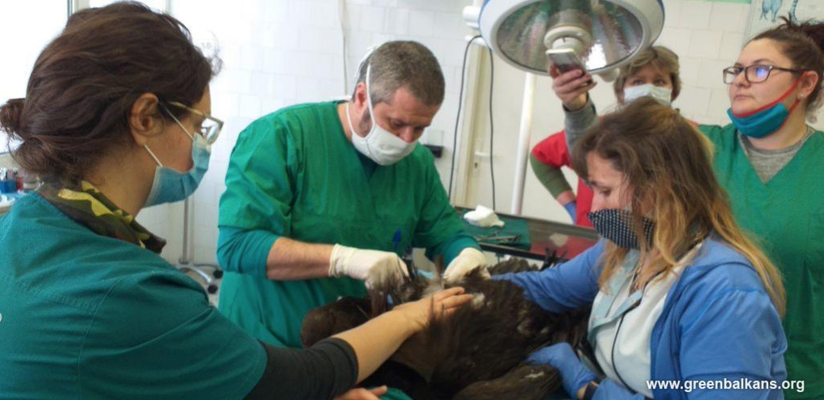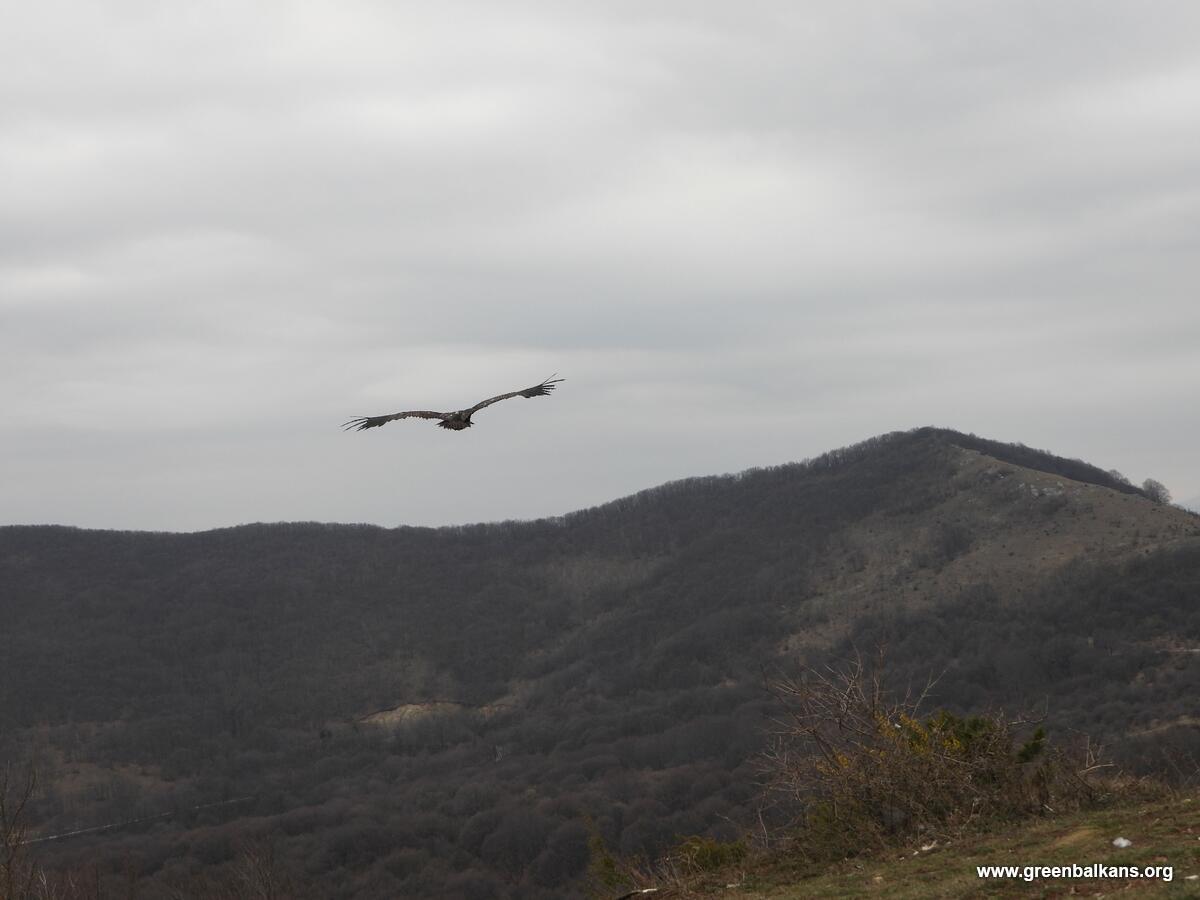
Today, there is more awareness and support for the restoration of the Cinereous Vulture in Bulgaria, thanks to years of work. But, there are still some who break the laws and harm these conservation efforts, like the poacher/s who illegally shot the reintroduced Cinereous Vulture Ultron, almost a year after its release to the wild. The Vultures Back To LIFE team did everything they could to save the bird, but in the end it died due to the severity of its wounds. The team is now actively pressuring the relevant authorities to find and prosecute the poacher/s responsible.
Cinereous Vulture Ultron

In the summer of 2019, the Belgian Planckendael zoo donated the young Cinereous Vulture named Ultron to the Vultures Back To LIFE project to support the reintroduction of the species in Bulgaria. The project released the bird in the Kotlenska Planina region, near Kotel, where our colleagues from the Fund for the Wild Flora and Fauna monitored and closely followed Ultron’s movements in the wild.
Short time in the wild

Shortly after, Ultron fledged the nest, seemingly by falling from the hacking platform and making its first insecure flights. The young vulture was improving with each passing day and quickly learned to fly well. After it spent the next few months in the release area, Ultron joined the other reintroduced Cinereous Vultures and embarked on short and long journeys — a typical behaviour from young birds of this species. Together, the vultures visited neighbouring and distant countries, gaining experience, making important connections with other Cinereous Vultures, before eventually returning home to settle down.
Luckily, Ultron did not waver far from Bulgaria and wintered in a suitable area — the Dadia National Park in the Greek parts of the Rhodope Mountains, where the only breeding colony of the species remains in the Balkans. There, Ultron could observe and interact with its fellow Cinereous Vultures and was under the supervision of local specialists who monitor its condition. In spring, Ultron headed home and returned to Bulgaria.
Shot and killed on its way home
On the way back home, Ultron had to make a stop near Kardzhali due to the bad weather, where it had a tragic encounter. The GPS tag on the bird sent data about the bird’s distress, so the Vultures Back To LIFE team immediately went to search for the bird in the field. They found Ultron distressed, shot and covered in blood. The field team immediately took the bird to the intensive care at the Green Balkans Rescue Center in Stara Zagora where a team of veterinarians spent days fighting for its life. Despite the operation and the best efforts by experts from the Rescue Center and the Trakia Unversity – Stara Zagora to save the bird, the bird died less than a month before its first birthday.
Active investigation to prosecute the poacher/s
The Cinereous Vulture is a species of conservation importance and is protected under the Biodiversity Act from 2002. It is included in the Red Data Book of the Republic of Bulgaria as well in Annex 3 to Article 37 from the Biodiversity Act. The habitats of the species are protected under the Council Directive 92/43/EEC on the conservation of natural habitats. The species is protected under Article 37 from the Biodiversity Act in the whole country.
The Vultures Back To LIFE team is committed to finding those responsible and holding them accountable for their actions and there are some tools that will help them do so. The data from the GPS tags that helps track the birds’ movement and find out more about the ecology of the species allows experts to monitor and analyze the data from the transmitters almost immediately. With the help of GPS transmitters, the video surveillance at the feeding stations and the camera traps more and more offences can be established, and the perpetrators can be caught and sanctioned.
The team notified RIEW – Haskovo and the Kardzhali District Prosecutor’s Office about the case. A case file has been opened, and an investigation is underway. However, there was no further information or reactions and it has been two months now. So, our Bulgarian colleagues are carrying our a campaign to raise awareness about the issue and add pressure to the relevant authorities to take action.
If you have any information about the case, we urge you to notify the investigating bodies – Kardzhali District Prosecutor’s Office and Ministry of Interior – Kardzhali.
There is so much effort and work involved when it comes to reintroducing a species back to a country. Even when it comes to one bird, it matters. Think of this case — the extensive scientific research and fieldwork behind this project, breeding Ultron in captivity, transporting and releasing the bird, monitoring its progress, then rescuing it and rehabilitating, and in the end, the bird died due to an illegal activity by one or more individuals. This incident is a huge blow against nature protection in Bulgaria and the Balkans. It is indeed devastating and disappointing to the whole team involved in reintroducing Cinereous Vultures in Bulgaria. Still, this does not deter us from continuing to tackling actions head on and conserving the species to see their comeback in different European regions. Well done to everyone involved for their quick mobilisation to save Ultron and for their actions to find the poacher/s responsible and bring them to justice.
Vultures Back To LIFE

Led by the wildlife conservation charity Green Balkans, with activities also implemented by the Fund for Wild Flora and Fauna, and bringing together partners from Bulgaria, Spain and Germany, Vultures Back to LIFE aims to reintroduce the cinereous or Eurasian black vulture to Bulgaria. The team will transfer and release around 60 birds, some from captive-breeding, but mostly coming from wildlife rehabilitation centers in Extremadura (Spain) into the wild in Bulgaria as well as creating supplementary feeding stations and improving populations of wild herbivores, improving the nesting conditions and creating artificial nest sites and tackling some of the major threats to vultures in the country such as insulating electricity pylons and illegal use of poison in the nature.






